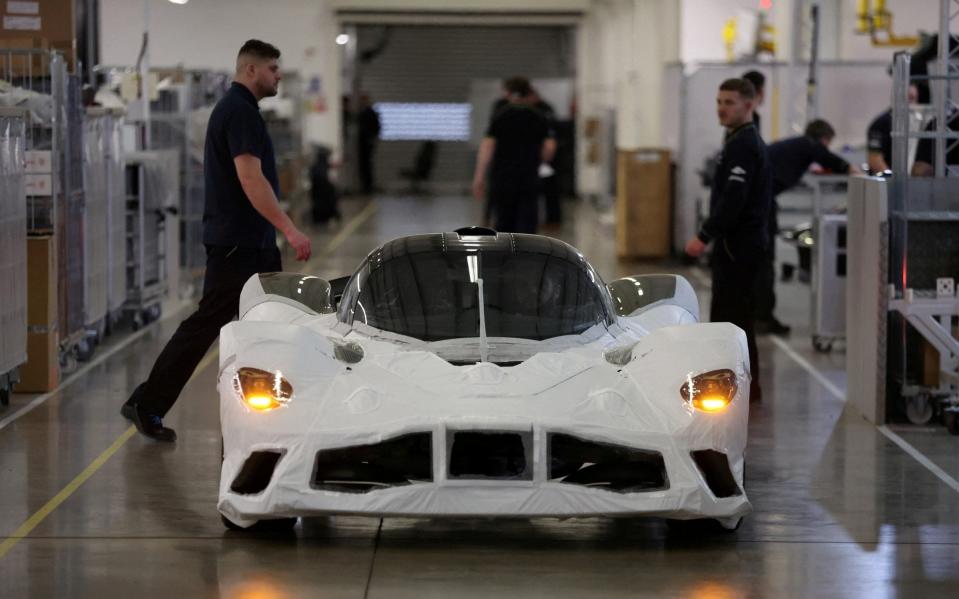Chinese money buys Aston Martin more time, but not an electric future

Mid-life crises can be pricey affairs, as Lawrence Stroll, the chairman and primary shareholder of Aston Martin, can attest.
Not content with being a billionaire, Stroll decided when he hit 60 that it was time to swap overpriced handbags and designer clothes for luxury cars. Though the Canadian had long been a sports car enthusiast, he quickly discovered that owning a company that makes them is an even more expensive hobby – especially when that company has been bankrupt six times previously.
So, with more than just a slight sense of inevitability, James Bond’s favourite carmaker has screeched back into the pits for yet another refuelling – proving that it is even better at burning cash than it is at guzzling gas.
The latest fundraising is the fifth since Stroll squeezed into his racing suit and leapt behind the wheel in 2020. It means more than £1.5bn has been pumped into the tank in just three years, as its attempts to get roadworthy have repeatedly hit the skids.
Stroll, who made his fortune through high-end bag-maker Michael Kors and fashion brand Tommy Hilfiger, arrived with promises of pulling off the car industry’s most unlikely turn-around. One might ask whether he is better at selling shares than cars.

This time, the Chinese car giant Geely has been persuaded to ride to the rescue, leaving shareholders with several further pressing questions. Who stands to benefit most from this repair job? And just how transformative is it likely to be for a company that has been struggling to find first gear since screeching onto the stock market in 2018?
It’s certainly hard to see how Aston’s plans to electrify a brand renowned for the roar of its big petrol engines are finally lent the credibility that has proved so elusive.
Under the terms of a new “long-term partnership”, Geely is paying £234m to lift its existing stake from 7.6pc to 17pc to leapfrog Mercedes-Benz and become Aston’s third largest investor behind Stroll’s Yew Tree investment vehicle, and Saudi Arabia’s state-backed Public Investment Fund. The Chinese will also be handed a seat on the Aston board.
But of the total proceeds, £140m will go to Yew Tree as it offloads 42 million shares at 335p-a-share and reduces its holding. It’s hardly a vote of confidence from Stroll himself.
Indeed, shareholders might also be wondering whether he still believes Aston is simply a “a jewel in need of a polish”, as he hastily proclaimed upon taking control, or if ultimately it will prove to be the beginning of the end for Yew Tree’s involvement.
Meanwhile, armed with just £94m of the overall pot – equivalent to 40pc – it is not immediately obvious how the tie-up is meant to “help this iconic automotive brand achieve its full potential”, as Geely chairman Eric Li claims.
There’s undoubtedly something to be said for partnering more closely with Geely, despite all the concerns that come with cooperation with any Chinese organisation. Against all expectations, it managed to rescue Volvo from the scrapheap more than a decade ago and restore the Swedish carmaker to former glories, crowning its revival with a stock market listing in Stockholm in 2021.
The pair have also established a series of acclaimed electric models that are seen as genuine Tesla-challengers under their jointly-owned Polestar brand.
In Sweden, Volvo’s new owners were initially greeted with a mixture of scepticism and bewilderment when they swooped in 2010, given Geely’s status as China’s 36th largest carmaker but its bosses came to be feted as geniuses for financing Volvo’s turn around entirely out of its own cash flow.
Stroll and his partners are understandably excited about the prospect of “exploring joint technology synergies”. Ditto talk of “new growth opportunities”. As Stroll says, the relationship with Geely “offers us a deep understanding of the key strategic growth market that China represents”.
Yet, there is a risk that once the spin is stripped away, all Geely’s investment really succeeds in doing is buying Aston more time from the painful financial reckoning that surely has to come at some point, yet does little-to-nothing in terms of securing the electric future it recently committed to.
While the company may well benefit from an injection of Chinese industrial nous, it barely scratches the surface of the struggling company’s huge financial problems. Surely a complete overhaul of its heavily stretched balance sheet would be of a far greater benefit.
Weighed down with an £870m debt costing £140m last year to service, Aston’s financial position remains precarious, which seems completely implausible given all the external funding it has had, not to mention a succession of loan and bond refinancings.
It’s not just that the electrification of supercars seems in direct conflict with the characteristics that appeal most to prospective owners. Aston claims it can replicate the purr of its models with the latest speaker technology, but the sceptics – of which there are many – insist that by replacing the petrol engine of a high performance sports car with a battery-powered one you are effectively removing its soul.
A bigger challenge is the sheer cost. Car bosses say the shift is the most expensive mission that the industry has ever embarked upon.
With annual losses standing at nearly £500m last time around, Aston’s hand-to-mouth existence seems incompatible with such a massive undertaking. Geely, which already controls rival British marque Lotus, may end up in the driving seat soon.

 Yahoo Finance
Yahoo Finance 